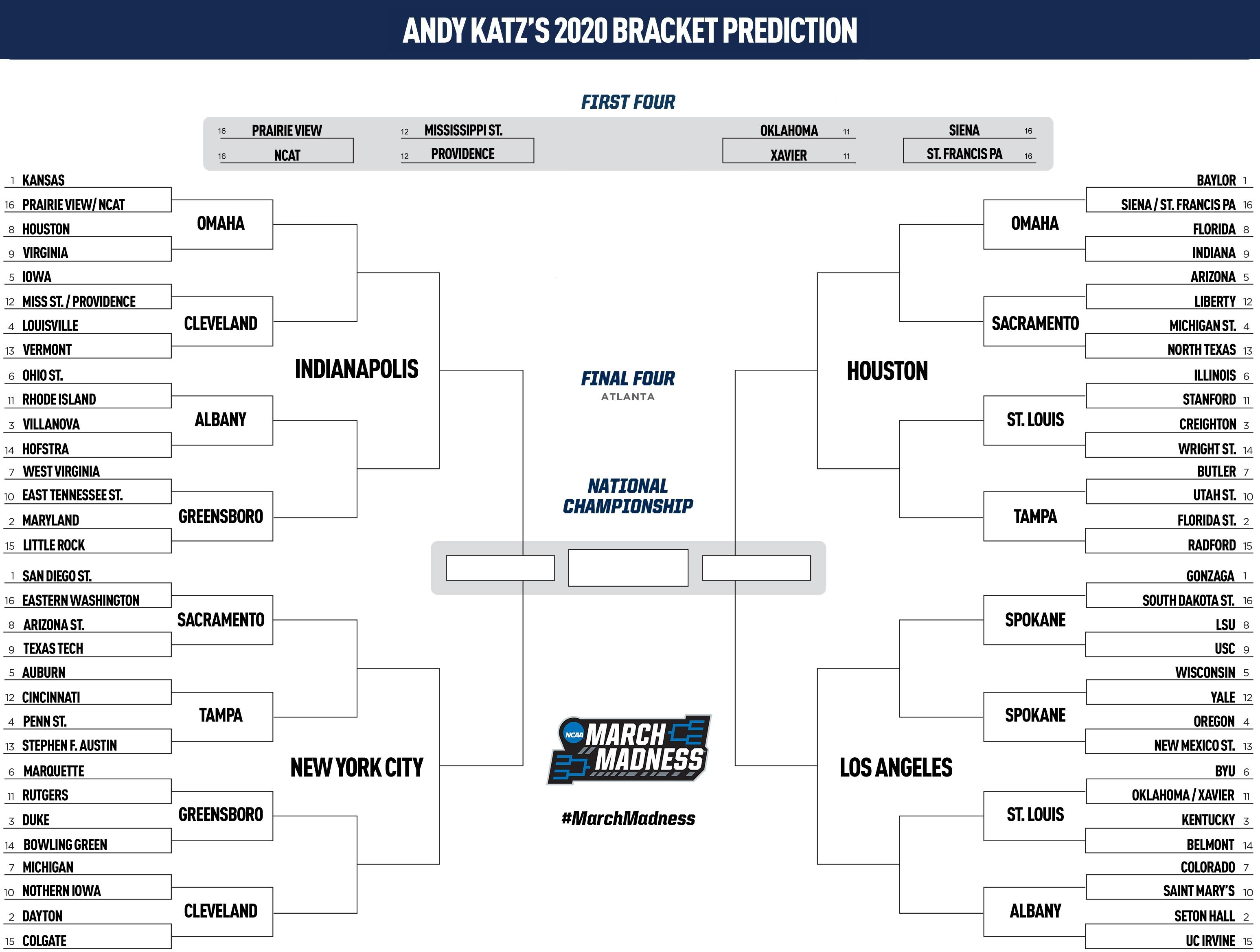
NCAA Bracket Predictions: Why Perfection is Almost Impossible
As March Madness approaches, sports enthusiasts are eager to dive into NCAA bracket predictions. The allure of crafting the perfect NCAA bracket captivates millions, sparking discussions about the chances of winning the NCAA tournament and the intricate NCAA bracket odds. Historically, the statistical likelihood of achieving a perfect bracket is astronomically low, akin to defying the odds of winning the Powerball twice. Amidst the excitement, discerning fans also focus on strategic upset picks in NCAA games, which can be the key to outshining competition in office pools. With the right blend of analysis and a dash of luck, this year’s predictions could lead to thrilling upsets and the elusive perfect bracket.
With the NCAA tournament just around the corner, the buzz about potential bracket outcomes intensifies. Many fans engage in predicting the tournament’s results, considering various factors that influence game play, referred to as NCAA tournament forecasts. The quest to achieve a flawless bracket involves analyzing March Madness statistics and evaluating each team’s strengths and weaknesses. As the teams battle for supremacy, the importance of picking strategic upset selections becomes paramount for those looking to excel in their brackets. By combining informed choices with a sprinkle of intuition, fans gear up for what promises to be an exhilarating season filled with surprises.
Understanding the Odds of a Perfect NCAA Bracket
When it comes to the NCAA tournament, picking a perfect bracket is often deemed an impossible feat. The odds, as explained by statistician Kevin Rader, are mind-boggling; specifically, the probability stands at 1 in 2^63, or approximately 1 in 9.2 quintillion. To put this in perspective, it’s akin to winning the Powerball twice in a row. Even with substantial preparation and knowledge of the teams, the nearly infinite variables—from team performance to injury reports—make it nearly impossible for anyone to predict every game accurately and achieve that elusive perfect bracket.
The conversation around the perfect NCAA bracket often surfaces during March Madness, amplifying the excitement and frenzy of college basketball. Despite extensive analysis of past performances and March Madness statistics, no one has officially claimed to hold a perfect bracket. The unpredictability of sports, particularly in the first round where the top seeds almost never lose, complicates any predictions. Even if the best teams consistently win, the potential for unexpected upsets looms large, creating a scenario where the chance of a flawless prediction remains ridiculously slim.
Chances of Winning Your NCAA Pool
Winning an NCAA office pool requires more than just luck; it necessitates strategic thinking and an understanding of NCAA bracket odds. While choosing favorites is generally a safe approach, the key to differentiating your selection usually involves predicting upset picks in NCAA tournaments. Being aware of lesser-known teams that have the potential to pull off surprises is instrumental to success. In large office pools, relying solely on favorites often lands you in the middle of the pack; hence, incorporating a few calculated upsets into your bracket can make all the difference.
Moreover, the chances of winning your NCAA pool depend significantly on how many participants are involved. In smaller groups, your margin for error widens, granting you more flexibility. Conversely, in larger competitions with dozens or even hundreds of entries, you must be more strategic about your selections. Balancing favorability with risk becomes essential; while you should lean on statistical analysis to make informed choices, don’t hesitate to throw in unexpected disruptors to keep your bracket competitive and enhance your chances of winning.
Strategies for Selecting Upset Picks in NCAA March Madness
Predicting upset picks during the NCAA tournament is a delicate art that blends statistical analysis with an understanding of teams’ dynamics. Many fans rely on March Madness statistics to guide their choices, analyzing factors such as team strengths, historical performance, and player health. However, upsets often stem from overlooked elements, like team morale or specific matchups intangibles that statistics alone can’t encapsulate. Researching each team and their current form can yield valuable insights that traditional stats may not highlight.
To become well-versed in making effective upset picks, consider engaging with expert analyses or statistical models that track various aspects of team performances across the season. Seeking out information about potential dark horses—teams that historically perform better than expected—is another good tactic. By following these insights and employing a strategic mindset, you will significantly improve your chances of identifying those crucial upsets that can propel your NCAA bracket ahead of the competition.
Analyzing March Madness Statistics for Bracket Success
March Madness statistics serve as an essential tool in navigating the unpredictable nature of the NCAA tournament. Statistical analysis can provide insights into team performance metrics, such as points per game, defensive efficiency, and historical tournament success. Understanding these key figures allows you to identify not just the strongest teams but also potential dark horses that could affect your bracket outcomes. By closely examining these statistics, you equip yourself with a stronger foundation for making informed selections.
Additionally, keeping track of trends over multiple tournament years can reveal patterns that aren’t immediately apparent in one-off seasons. Certain teams may consistently outperform expectations, while others frequently disappoint. By analyzing previous years’ brackets and outcomes, you can better gauge which teams to favor and which ones may fall victim to upsets. This strategic approach to interpreting March Madness statistics can significantly enhance your chances of creating a successful NCAA bracket prediction.
Using NCAA Bracket Odds to Your Advantage
When forming predictions for the NCAA tournament, understanding NCAA bracket odds is paramount. These odds reflect not only a team’s perceived strength based on historical success but also current performance trends as the tournament approaches. Bettors and analysts alike utilize these odds to gauge favorites and underdogs, providing a helpful framework for your bracket selections. Incorporating odds into your strategy allows for a balanced approach, ensuring that you’re not only relying on personal biases but on quantifiable data.
Moreover, staying updated on changes in the NCAA bracket odds as the tournament progresses can offer insights into emerging trends. If a team’s odds drastically change—often due to injuries or shifts in performance—it might signal that the public perception of that team is shifting. Such fluctuations should be accounted for while finalizing your bracket choices. By leveraging NCAA bracket odds effectively, you can make informed predictions that stand a better chance against the unpredictable nature of March Madness.
The Role of Luck in NCAA Tournament Success
Despite comprehensive analysis and strategic planning, the role of luck in the NCAA tournament cannot be overstated. Every year, March Madness showcases numerous instances where lower-ranked teams outperform expectations, completely overturning bracket predictions. Such unexpected outcomes highlight that while statistical trends and favorites matter, random chance plays a critical part in determining the winner. The unpredictable nature of sports is what makes March Madness so thrilling, where every game can be influenced by a single play or decision.
Additionally, luck is not just about the games themselves. It extends to the selection process prior to the tournament as well. Fans often find themselves swayed by an emotional connection to a team or a player, which can ultimately lead to choosing teams that may not statistically have the best chance of success. This emphasis on lucky breaks—both on the court and in decision-making—serves as a reminder that unpredictability is inherent in the tournament, emphasizing the need for flexibility in your bracket planning.
Predictive Models and Their Impact on Bracket Outcomes
As technology advances, predictive models have become increasingly popular among fans looking to enhance their NCAA bracket predictions. These models employ complex algorithms that analyze vast datasets—encompassing past performances, head-to-head matchups, and even player statistics—to forecast potential outcomes of March Madness games. Using such models can greatly minimize risks by providing insights based on historical data and relevant trends, allowing fans to make more educated selections for their brackets.
However, while predictive models offer valuable data-driven insights, it’s essential to remember that every tournament can yield surprising results. Relying solely on a model without accounting for human elements—such as team chemistry or coaching strategies—might not yield the best results. A balanced approach that combines statistical model predictions with personal evaluations of teams can maximize your chances of creating a competitive NCAA bracket that stands out in any pool.
The Psychological Aspects of Bracket Selection
The psychological dimension of NCAA bracket selection often plays an overlooked but crucial role in the outcome of March Madness pools. Many fans experience emotional biases when choosing teams—rooting for favorites based on historical loyalty or personal connections rather than pure statistical backing. Being aware of these biases can help you make more rational choices when crafting your bracket, ensuring you base selections on objective data instead of mere fandom or gut feelings, which can be misleading.
Additionally, understanding the cognitive biases at play can significantly influence how you interpret available information before submitting your bracket. For instance, the availability heuristic may lead you to favor teams that have recently appeared in headlines or were top contenders in previous tournaments, even if the current situation suggests otherwise. By actively seeking to mitigate these biases, you can enhance your ability to pick more successful brackets that aren’t swayed by emotion but are anchored in factual analysis.
Preparing for March Madness: Essential Tips for Bracket Success
As March Madness approaches, preparing your NCAA bracket involves a blend of analysis and strategic foresight. Start by researching teams rigorously, noting factors like regular-season performance, injuries, and potential matchups. Gathering data on how teams fared against common opponents or how they performed in previous tournament settings can provide invaluable insights that might affect the outcomes of games. The more information you accumulate, the better positioned you’ll be to make informed predictions.
Moreover, create a plan for adjusting your bracket as new data emerges during the tournament. Keeping an eye on player performance updates and any late-breaking news can inform last-minute changes that might enhance your chances of success. Remember that being adaptable can be as essential as your initial picks; the landscape of March Madness is dynamic, and your selections should reflect that. In addition to preparation and research, embrace the excitement and uncertainty of the tournament, turning bracket contrasts into opportunities for discussion and enjoyment.
Frequently Asked Questions
What are the chances of winning the NCAA tournament with a perfect NCAA bracket?
The chances of creating a perfect NCAA bracket are astronomically low, with odds often cited as 1 in 2^63, which is in the quintillions. No one has recorded a perfect bracket, making it exceedingly unlikely. Players often face better odds in other lottery scenarios, highlighting the difficulty of NCAA bracket predictions.
How do upset picks in NCAA tournaments affect bracket predictions?
Upset picks in NCAA tournaments are crucial for NCAA bracket predictions as they can differentiate your entries from others, especially in large pools. Successfully identifying potential upsets can significantly improve your odds of winning your office pool.
What are NCAA bracket odds based on March Madness statistics?
NCAA bracket odds are heavily influenced by March Madness statistics, including team performance records, head-to-head matchups, and seedings. Analyzing these stats can help improve your predictions by identifying potential favorites and possible upsets.
Is it more effective to always choose favorites in NCAA bracket predictions?
While picking favorites is a common strategy in NCAA bracket predictions, relying solely on favorites is not enough for success, especially in large pools. To enhance your chances, it’s important to mix in some upset picks to set your bracket apart from the competition.
What strategies can I use for better NCAA bracket predictions?
To optimize your NCAA bracket predictions, analyze team statistics, consider historical performance during March Madness, and identify potential upset picks. Balancing your selections between favorites and a few strategic underdogs can maximize your chances of success.
Why have no perfect NCAA brackets been reported?
No perfect NCAA brackets have been reported largely due to the randomness and unpredictability of the tournament. The combination of 64 games and potential upsets makes achieving a perfect bracket highly improbable in any tournament year.
How do I know which NCAA bracket predictions are most likely to win?
To identify NCAA bracket predictions most likely to win, track March Madness statistics, study team performance patterns, and use data analytics. Also, consider the historical trend of higher seeds performing better, while strategically including well-researched upset picks.
What role do statistics play in making NCAA bracket predictions?
Statistics play a critical role in NCAA bracket predictions as they provide insights into team strengths, weaknesses, and historical performance. Leveraging these statistics can help make informed decisions when filling out your bracket and enhancing winning potential.
What factors contribute to the unpredictability of NCAA bracket results?
Several factors contribute to the unpredictability of NCAA bracket results, including unexpected upsets, injuries to key players, team dynamics, and the overall randomness of the tournament format. These variables make it challenging for even seasoned analysts to accurately predict outcomes.
How do I increase my chances of winning an NCAA bracket pool?
To increase your chances of winning an NCAA bracket pool, research team performance and historical data, mix favorite picks with strategic upset choices, and consider the size of your pool to tailor your strategy accordingly. This balanced approach can set your predictions apart.
| Key Point | Explanation |
|---|---|
| The odds of a perfect NCAA bracket are extremely low | The probability is 1 in 2^63, which equals quintillions, making it as unlikely as winning the Powerball twice. |
| No reported perfect brackets in history | As of the current season, no perfect brackets have been reported among all publicly available entries. |
| Top seeds rarely lose in the first round | Most top-seeded teams perform well initially, reducing the randomness of outcomes. |
| Upsets are common, but difficult to predict | While good teams often win, predicting upsets accurately is challenging and essential for winning brackets. |
| Winning an office pool requires strategy | To win in larger pools, players must pick favorites and a few upsets to stand out from competitors. |
| Use statistics and information for better predictions | Rely on statistical analysis rather than random guessing, especially when discrepancies between teams are significant. |
Summary
NCAA bracket predictions are a challenging endeavor, primarily due to the incredibly low odds of creating a perfect bracket. Understanding the statistical probabilities, the history of outcomes, and strategic selections, such as balancing favorites with unexpected upsets, can enhance one’s chances. While the excitement of March Madness draws many in, it’s crucial to navigate the complexities of the tournament with informed choices.


